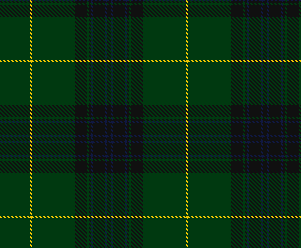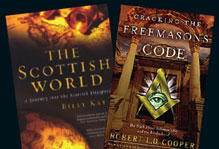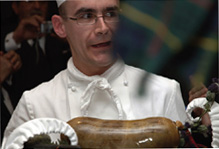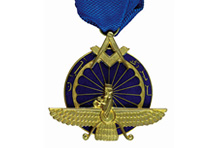
This splendid tartan is based on the colours as used by Grand Lodge since its inception in 1736 as well as other colours of Masonic and/or Scottish significance. The main colours are Thistle Green and Gold. The minor colours are blue and black.
Green
Thistle Green was possibly chosen by the Grand Lodge of Scotland because the founder members were inspired by the Order of the Thistle (founded in 1687) - the highest Order of Chivalry in Scotland. Thistle Green also reminds us of our national flower (some would say weed!) - the Thistle, and the associated legend that an invading Viking army went barefoot to sneak up on sleeping Scots. When they stood on thistles the Scots were alerted and the Vikings were defeated. Green is also the colour of good luck.
Gold
The Grand Lodge of Scotland's motto is - 'In the Lord is all our Trust' and is reflected in the use of Gold in the tartan as this colour represents T.G.G..O.T.U. Gold also represents the masculine - entirely appropriate for an all male organisation.
Blue
Dark blue is symbolic of wisdom and loyalty. The former reminds us of Solomon and the latter he who is the most prominent in our final ceremony. The colour also serves to remind us of the main colour of our national flag - the Saltire.
Black
Whilst recognising that black is not a 'real' colour, as such, it is used in the tartan because of its paramount symbolic importance in the highest degree in Freemasonry - that of a Master Mason. When wearing this tartan every Freemason will be constantly reminded of the lessons of the Third Degree and to regulate his thoughts and actions accordingly. Although this is the significance of black in this tartan black also has for Freemasons, the symbolic attributes of mystery, which is entirely appropriate for those who have been Initiated into the Mysteries of Freemasonry.
(Visitors might also be interested in the article Why no Masonic Tartan? and to read that click here or on the previous link or go to Masonic Subjects and find Articles of Masonic Interest).



